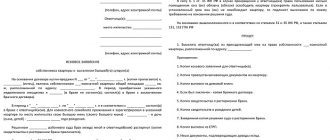A person cannot submit documents on his own - what to do?
It is possible that the relative is very busy at work or is currently on a business trip in a distant city, and he needs to be discharged urgently. There are other reasons for a citizen’s absence from the passport office at the required time. It is worth knowing when human presence is not required:
- If a citizen has changed his place of residence, he does not need to travel far just to be discharged. He can come to the passport office in the city where he currently lives. If a person refuses this, it will be possible to discharge him through the court.
- An elderly relative who was brought in by his children to take care of him and register him with them, of course, will not be able to come and check out himself. In this case, you will need a power of attorney certified by a notary, which confirms the right of the son or daughter to handle the pensioner’s documents.
- Sometimes it becomes necessary to discharge a young man who is undergoing military service. How to sign a person out of an apartment without his presence? If a young man is in the army, discharge may proceed without him. All you need is a certificate from the military registration and enlistment office confirming the fact of service.
- If a person is currently under arrest, then discharge occurs without him, but only after a court decision.
- If a citizen is officially declared missing, he is removed from the register at his place of residence.
- If a person dies, he is also discharged. To do this, you need to provide the original and a copy of the death certificate.
- According to a court decision, a person can also be discharged without his mandatory presence.
If housing is not privatized
You need to understand the reasons for the discharge and act on them. If there were no grounds, then you can go to court to protect your rights to the area. What could be the reasons for your eviction from privatized housing:
- Prolonged absence from registered housing.
- Use of housing for other prohibited purposes.
- Damage to property and disruption of public order.
All of the above only has consequences when there is evidence. And if you were discharged without knowledge with the help of the court, then this evidence was provided.
What do you need to go to court?
The following list of documents is needed:
- Everything that confirms your rights to this housing.
- Anything that confirms the invalidity of the reason why you were evicted.
- Additional information to help advance the case.
- Information that confirms identity.
Provide everything that proves your innocence and fight injustice to the last, if it clearly cannot be avoided.
Where to go?
To the district court at the place of registered residence. But before that, be sure to seek help from experienced specialists regarding discharge issues. You don’t know all the nuances and laws, so by deciding everything on your own, you risk not achieving the desired result. On our website we offer online and telephone consultations with experienced lawyers. It is also possible to sign up for a face-to-face consultation to discuss any legal issue, including this one. Our specialists will help you:
- Collect the necessary documents, information, evidence.
- They will assist in writing a statement of claim addressed to the district and other courts.
- They will advise and solve any legal problem that you have.
- They will assess your chances of success in your legal case.
There is enough deception and tricks in the modern world. To avoid falling into a legal trap and being left with nothing, do not delay in visiting professionals.
Sale of real estate: features of the extract
Those people who are planning to sell their living space are often interested in how to sign a person out of an apartment if I am the owner? In such a situation, it is important to remember the following points:
- It will be easier and better if the person discharges himself. Try asking him about it. If the negotiations go well, the relative will need to visit the passport office and write a statement there asking to be removed from the register;
- If you are going to discharge a child who is not yet 14 years old, one of the parents submits an application for him. If you are selling an apartment, then in order for the child to be discharged, you will need to wait for the official consent of the guardianship and trusteeship authorities. They may not give consent if the child’s living conditions worsen with the move;
- if you are divorced and want to remove your children from the apartment so that they can register with your ex-spouse, you will need the permission of your ex-husband (or wife);
- when a person has not lived in an apartment for many years, and there is no information about him for a long time, you can go to court to have him declared missing. But to do this, he must not appear in this apartment for at least 5 years.
How to discharge someone who does not appear in the apartment?
How to discharge a person from an apartment if he does not live at this address? The procedure will be as follows:
- First, find out where your local court is located.
- Prepare the facts for the court. The most common options are that a person has not lived in this house for a long time, or has moved to another apartment.
- Get ready for facts to be proven. It will be necessary to confirm that the person has never paid utility bills, or that he lives elsewhere.
- After this, you will need to write a statement of claim and also pay a state fee.
- When the issue is resolved in your favor and the court decision comes into force, you can obtain a writ of execution.
- With a writ of execution and an application for deregistration, you will need to come to the passport office and complete the matter there.
Sample statement of claim to remove a person from home
It is impossible to write out a former passion in case of refusal of privatization, since such a refusal gives the right to apply for lifelong residence. This right remains even if the owner of the property changes under the purchase and sale agreement. This term is applicable when a person who lives in an apartment receives a prison sentence or is subjected to compulsory treatment. At the same time, on the basis of a court decision, information about the temporary eviction of a person is entered into the house register.
Sample statement of claim to be discharged from an apartment in Ukraine
The father has similar rights. Parents have equal rights regarding the child, unless otherwise established by the court. It is impossible to expel a child who is the owner from the apartment. A minor child who is not the owner of the apartment may be discharged from it if certain legal requirements are met: If we are talking about the removal of a former spouse from a house registered under a social tenancy agreement, then this is possible subject to the following conditions:
An extract from the property for the plaintiff will cost 200 rubles, which must be paid as a state fee. If a claim is filed against several people at once, then a fee will have to be paid for each citizen.
The FMS requires fourteen days to discharge a person by court decision. There are often cases when the process was delayed up to one month, but this is only possible if the citizen is independently discharged. After deregistration, the defendant will be given a departure slip and a corresponding note will be made in the passport.
Form and example of a statement of claim
To do this, send the original statement of claim if the current address of residence is known (the claim must be sent by registered mail with notification), or provide a complete package of documents in hand if there is a possibility of a personal meeting. For additional evidence, you can bring witnesses with you.
If the case goes to court
It is worth taking a closer look at the situation when a person is discharged through the court. “How to discharge a person from an apartment without his consent through the court?” - people faced with a similar situation ask for advice
- the former spouse can be pointed to Article 31 of the Housing Code of the Russian Federation. According to this article, the former spouse cannot claim real estate that was acquired before marriage;
- It is somewhat more difficult to discharge a person from municipal rather than privatized housing (you will find information on how to carry out privatization here). It's worth being patient;
- if your relative now lives in another area, but has not checked out of the previous apartment and has not paid utilities for a long time, you have every reason to leave him;
- According to Article 91 of the Housing Code of the Russian Federation, those parents who for some reason were deprived of parental rights should not live with the child. They are discharged through the court. They are not provided with a new place of residence;
- if the apartment was privatized, and after privatization the owner registered a relative, he can easily register him. But it is important that a minor child cannot be discharged;
- if real estate was received by will or donated, but someone is registered in it, you can easily write out this person.
What laws should you rely on?
- Art.
304 of the Civil Code of the Russian Federation - “The owner may demand the elimination of any violations of his rights, even if these violations were not associated with deprivation of ownership.” In simple words, since the registration of the former son-in-law violates the rights of the owner to freely use the apartment, he has the right to demand the elimination of this violation.↓ - Then everything depends on how the former son-in-law is recorded in the house register, i.e. in what status the owner registered it. It's all about clause 1 of Art. 31 of the Housing Code of the Russian Federation - “Members of the family of the owner of a residential premises include his spouse living together with this owner in the residential premises belonging to him, as well as the children and parents of this owner. Other relatives, disabled dependents and, in exceptional cases, other citizens may be recognized as members of the owner’s family if they are settled by the owner as members of his family.” Therefore, I will analyze individual situations below.
Situation No. 1 - Registered as son-in-law
If in the house register for an apartment the former son-in-law is recorded as “son-in-law” or “daughter’s husband,” then the owner has registered him as a member of his family. This is the most common situation. The further chain of articles of the law:
- Clause 2 art. 16 of the RF IC and paragraph 13 of the Supreme Court Resolution No. 14 of July 2, 2009 - after the son-in-law divorces the owner’s daughter, he AUTOMATICALLY becomes his former family member and family relations with him are terminated.↓
- Clause 4 art.
31 of the Housing Code of the Russian Federation - a former son-in-law, as a former family member, does not retain the right to reside in the apartment, unless there was another agreement with the owner. In court, the owner must be informed that there were no agreements with the former son-in-law regarding his future residence. And if there were, they are now terminated.
Situation No. 2 - Not recorded at all
If in the house register the former son-in-law is recorded as a tenant or there is a dash, then the owner registered him not as a family member, but as a stranger.
In this situation, it is considered that when registering his son-in-law, the owner entered into an oral agreement with him for the free and unlimited use of the apartment - clause 2 of Art. 30 LC RF and clause 1 art. 689 of the Civil Code of the Russian Federation. Simply put, the owner allowed his son-in-law to live with him for an indefinite period.
The owner has the right, at his own request and unilaterally, to terminate oral agreements with a stranger regarding his residence - clause 1 of Art. 699 Civil Code of the Russian Federation. In our case, with a former son-in-law.
Situation No. 3 - It was registered by the previous owner
It does not matter how the son-in-law is entered in the house register. In the first and second situations, I wrote about when the owner who previously registered him wants to register his son-in-law. But in my practice there was a case when it was prescribed by the previous owner. Although this rarely happens, I decided to write about it anyway.
Briefly: the girl inherited an apartment, into which she then registered her husband. After some time, for certain reasons, she gave the apartment to her mother, but her husband remained registered as such. After her daughter’s divorce, the mother decided to write her ex-son-in-law out of her apartment.
The current owner comes to the aid of clause 2 of Art. 292 of the Civil Code of the Russian Federation - “The transfer of ownership of a residential building or apartment to another person is the basis for termination of the right to use residential premises by family members of the previous owner.” In simple words, those who were registered by the previous owner do not have the right to live in the apartment after the transaction.
Extract from public housing
How to discharge a person from an apartment through the court if the living space is municipal? Here are the arguments that are often presented in court:
- the tenant makes a scandal, makes noise at hours when it is prohibited, damages the entrance, and disturbs the neighbors in every possible way;
- a person has not paid utility bills for more than 6 months;
- the registered person uses his/her living space for other purposes;
- the person is using the property incorrectly. For example, incorrect use of a stove can lead to a household gas explosion, which can cause harm not only to the apartment resident himself, but also to his neighbors;
- if the ex-spouse has housing, but he does not want to live there because the living conditions are worse, the court will oblige the person to be discharged as quickly as possible and return to his place.
How can I help a relative who wants to be discharged?
It happens that a person himself wants to be discharged as soon as possible. For example, when a child has grown up, reached adulthood and purchased an apartment or received it as a gift from his grandmother. Of course, he wants to quickly start an independent life in a new place. Or a relative who has moved asks you to help him sort out his housing situation. How to discharge a person from an apartment with his consent?
In a situation where a person himself insists on discharge, the procedure will be as follows:
- The relative must write a power of attorney and have it certified by a notary. In it, he indicates that he trusts you to handle his documents.
- You will need to come to the passport office with the following papers - a notarized application and power of attorney, a relative’s passport, a military ID (if he is liable for military service).
- When all the documents have been submitted, the passport office staff will set a day for you to come pick up your loved one’s passport. You will see a discharge stamp in it.
To prevent the matter from going to court, it is better to try to resolve problems with the discharge peacefully. But if an agreement fails, or is simply impossible (in the case when a person is not in this apartment for a long time), you have to go to court.
It’s better to endure the inconvenience of collecting documents and going to court and the passport office for a while, but then live in peace in the apartment!







